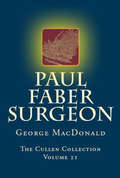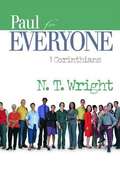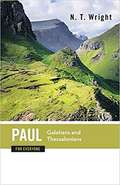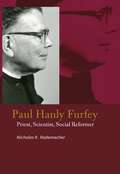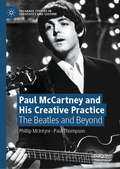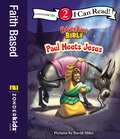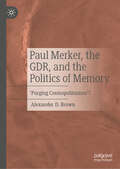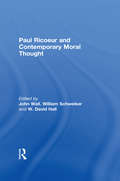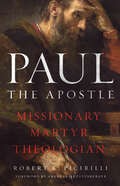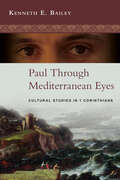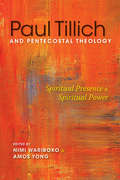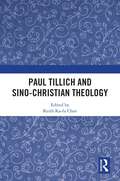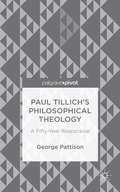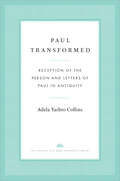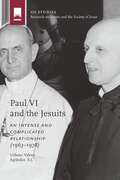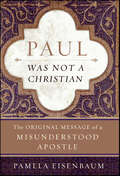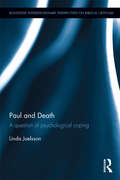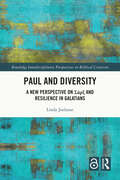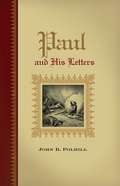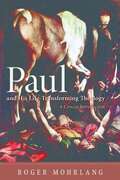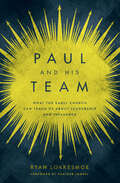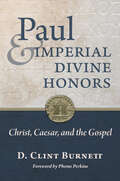- Table View
- List View
Paul Faber Surgeon (The Cullen Collection #21)
by George MacDonaldSecond in the Wingfold Trilogy following Thomas Wingfold Curate from one of the greatest writers of Victorian-era Scotland. A country doctor in the fictional city of Glaston, atheist Paul Faber, encountering spiritually invigorated minister Wingfold, finds himself unexpectedly drawn into his own unwelcome quest for truth. Now it is Wingfold—assisted by Polwarth—sharing his newfound faith with both Paul Faber and Juliet Meredith, whose past secrets draw them together yet also threaten to tear them apart. Michael Phillips comments, &“Of MacDonald&’s unique characters, one stands alone—Paul Faber, the surgeon of fictional Glaston. He is the only skeptic, unbeliever, and atheist to take the spotlight as a featured title character. The relationship between Thomas Wingfold, the curate, and his atheist friend . . . gives us a vivid picture of George MacDonald&’s perspective on how the life of Christ is most effectively communicated into an unbelieving world . . . It is conveyed by the way Christians live.&”
Paul For Everyone: 1 Corinthians
by N. T. WrightMaking use of his scholar's understanding, yet writing in an approachable and anecdotal style, Tom Wright shows us the liveliness of cosmopolitan Corinth and reveals the wisdom and challenge of Paul's writing, bringing out the pastoral sensitivity and deep insight that make this letter one of Paul's crowning achievements. Tom Wright has undertaken a tremendous task: to provide guides to all the books of the New Testament, and to include in them his own translation of the entire text. Each short passage is followed by a highly readable discussion, with background information, useful explanations and suggestions, and thoughts as to how the text can be relevant to our lives today. A glossary is included at the back of the book. The series is suitable for group study, personal study, or daily devotions.
Paul For Everyone: Galatians And Thessalonians (The New Testament For Everyone)
by N. T. WrightTom Wright's eye-opening comments on these letters are combined, passage-by-passage, with his fresh and inviting new translation of the Bible text. Making use of his true scholar's understanding, yet writing in an approachable and anecdotal style, Wright captures the tension and excitement of the time as the letters seek to assert Paul's authority and his teaching against other influences. Tom Wright has undertaken a tremendous task: to provide guides to all the books of the New Testament, and to include in them his own translation of the entire text. Each short passage is followed by a highly readable discussion, with background information, useful explanations and suggestions, and thoughts as to how the text can be relevant to our lives today. A glossary is included at the back of the book. The series is suitable for group study, personal study, or daily devotions.
Paul Hanly Furfey: Priest, Scientist, Social Reformer (Catholic Practice in North America)
by Nicholas K. RademacherNicholas Rademacher’s book is meticulously researched and clearly written, shedding new light on Monsignor Paul Hanly Furfey’s life by drawing on Furfey’s copious published material and substantial archival deposit. Paul Hanly Furfey (1896–1992) is one of U.S. Catholicism’s greatest champions of peace and social justice. He and his colleagues at The Catholic University of America offered a revolutionary view of the university as a center for social transformation, not only in training students to be agents for social change but also in establishing structures which would empower and transform the communities that surrounded the university. In part a response to the Great Depression, their social settlement model drew on the latest social scientific research and technique while at the same time incorporating principles they learned from radical Catholics like Dorothy Day and Catherine de Hueck Doherty. Likewise, through his academic scholarship and popular writings, Furfey offered an alternative vision of the social order and identified concrete steps to achieve that vision. Indeed, Furfey remains a compelling exemplar for anyone who pursues truth, beauty, and justice, especially within the context of higher education and the academy.Leaving behind an important legacy for Catholic sociology, Furfey demonstrated how to balance liberal, radical, and revolutionary social thought and practice to elicit new approaches to social reform.
Paul McCartney and His Creative Practice: The Beatles and Beyond (Palgrave Studies in Creativity and Culture)
by Paul Thompson Phillip McIntyreThis book provides fresh insight into the creative practice developed by Paul McCartney over his extended career as a songwriter, record producer and performing musician. It frames its examination of McCartney’s work through the lens of the systems model of creativity developed by Mihaly Csikszentmihalyi and combines this with the research work of Pierre Bourdieu. This systems approach is built around the basic structures of idiosyncratic agents, like McCartney himself, and the choices he has made as a creative individual. It also locates his work within social fields and cultural domains, all crucial aspects of the creative system that McCartney continues to be immersed in. Using this tripartite system, the book includes analysis of McCartney’s creative collaborations with musicians, producers, artists and filmmakers and provides a critical analysis of the Romantic myth which forms a central tenet of popular music. This engaging work will have interdisciplinary appeal to students and scholars of the psychology of creativity, popular music, sociology and cultural studies.
Paul Meets Jesus: Level 2 (I Can Read! / Adventure Bible)
by ZondervanPaul disliked the followers of Jesus. He worked very hard to hurt anyone who loved him. He even tried to throw them all in jail. But one day Jesus met him on the road to Damascus. Find out what happened next to Paul in this Level 2 I Can Read written and illustrated in the style of the bestselling NIV Adventure Bible.Perfect for beginning readers ages 4-8, learning Bible stories on their own.
Paul Merker, the GDR, and the Politics of Memory: ‘Purging Cosmopolitanism’?
by Alexander D. BrownThis book presents ground-breaking research into the ‘Merker affair,’ a series of events that took place in the German Democratic Republic (GDR) in the early 1950s, which saw Paul Merker, a member of the ruling party’s ‘Politburo,’ become ensnared in the agent hysteria of the period. He was ultimately deposed, arrested, and convicted on charges of espionage. However, the cultural significance of this affair goes far beyond the history of the early Cold War; it has become the definitive symbol of alleged antisemitism in the GDR. The narrative complex of an antisemitic GDR has in turn become a prominent topos within the politics of memory in Germany. The author combines an empirical study of the pertinent primary sources with a genealogical analysis of discourse on the Merker affair in order to question and historicise many of the entrenched historiographical tropes surrounding it, and indeed broader subjects such as antifascism and antisemitism in a German context. In doing so, the book offers insight into how German state-mandated institutions and official bodies have shaped our collective vision of the past.
Paul Ricoeur and Contemporary Moral Thought
by John Wall; William Schweiker; W. David HallThis book explores and proposes new avenues for contemporary moral thought. It defines and assesses the significance of the writings of French philosopher Paul Ricoeur for ethics. The book also explores what matters most to persons and how best to sustain just communities.
Paul The Apostle: Missionary, Martyr, Theologian
by Robert E. Picirilli&“Except for the Lord Himself,no single figure has done more for the Christian faith.&” If you want to understand Christianity, you need to understand Paul. But with so many books on the apostle, where do you start? Paul the Apostle is the ideal choice if you want a solid understanding of Paul&’s life, ministry, and writings without getting weighed down with minutia. Author Robert E. Picirilli, who taught college courses on Paul for over twenty-five years, found that most books on the apostle were either too technical or too basic, so he wrote a book that strikes a happy medium. It offers:A profile of Paul in his historical and cultural contextOutlines and explanations of his missionary journeys Introductions and brief analyses of each of his epistlesUseful for individual study or as a textbook (as it is in many universities today), Paul the Apostle is a great one-stop study of the man who wrote half the New Testament, spread the gospel to the heart of the known world, and gave his life for the Kingdom.
Paul The Apostle: Missionary, Martyr, Theologian
by Robert E. Picirilli&“Except for the Lord Himself,no single figure has done more for the Christian faith.&” If you want to understand Christianity, you need to understand Paul. But with so many books on the apostle, where do you start? Paul the Apostle is the ideal choice if you want a solid understanding of Paul&’s life, ministry, and writings without getting weighed down with minutia. Author Robert E. Picirilli, who taught college courses on Paul for over twenty-five years, found that most books on the apostle were either too technical or too basic, so he wrote a book that strikes a happy medium. It offers:A profile of Paul in his historical and cultural contextOutlines and explanations of his missionary journeys Introductions and brief analyses of each of his epistlesUseful for individual study or as a textbook (as it is in many universities today), Paul the Apostle is a great one-stop study of the man who wrote half the New Testament, spread the gospel to the heart of the known world, and gave his life for the Kingdom.
Paul Through Mediterranean Eyes: Cultural Studies in 1 Corinthians
by Kenneth E. BaileyChristianity TodayPaul was a Hebrew of the Hebrews, steeped in the learning of his people.But he was also a Roman citizen who widely traveled the Mediterranean basin, and was very knowledgeable of the dominant Greek and Roman culture of his day. These two mighty rivers of influence converge in Paul's first letter to the Corinthians.With razor-sharp attention to the text, Kenneth Bailey examines the cultural milieu and rhetorical strategies that shaped this pivotal epistle. He discovers the deep layers of the Hebraic prophetic tradition informing Paul's writing, linking the Apostle with the great prophets of the Old Testament.Throughout, Bailey employs his expert knowledge of Near Eastern and Mediterranean culture to deliver to readers a new understanding of Paul and his world. Familiar passages take on a new hue as they are stripped of standard Western interpretations and rendered back into their ancient setting.
Paul Tillich and Pentecostal Theology
by Amos Yong Nimi WaribokoPaul Tillich (1886-1965) is widely regarded as one of the most influential theologians of the 20th century. By bringing his thought together with the theology and practices of an important contemporary Christian movement, Pentecostalism, this volume provokes active, productive, critical, and creative dialogue with a broad range of theological topics. These essays stimulate robust conversation, engage on common ground regarding the work of the Holy Spirit, and offer significant insights into the universal concerns of Christian theology and Paul Tillich and his legacy.
Paul Tillich and Sino-Christian Theology
by Keith Ka-fu ChanWith contributors from different generations of the Chinese-speaking world, the book addresses the relevance of Paul Tillich’s thought in the Chinese cultural-political contexts. Appropriating and transforming different themes of Tillich’s thought in the Chinese context, the contributors reframe the dialogue with Buddhism and Confucianism, religion and science, and religion and politics under the interpretation of Tillich’s ideas. The thought-provoking essays examine the intellectual potentiality or further contribution of Paul Tillich’s ideas in Sino-Christian Theology. The book will be of interest to scholars and postgraduate students studying Paul Tillich’s thought, Chinese theology, and East-West religious dialogues.
Paul Tillich’s Philosophical Theology: A Fifty-Year Reappraisal
by George PattisonPaul Tillich's Philosophical Theology takes up the challenge as to whether his thought remains relevant fifty years after his death. In opposition to those who believe that his writings have little to say to us today, this book argues that his thought is largely exemplary of open theological engagement with the contemporary intellectual situation.
Paul Transformed: Reception of the Person and Letters of Paul in Antiquity (The Anchor Yale Bible Reference Library)
by Adela Yarbro CollinsA fascinating reception history of the theological, ethical, and social themes in the letters of Paul In the first decades after the death of Jesus, the letters of the apostle Paul were the chief written resource for Christian believers, as well as for those seeking to formulate Christian thought and practice. But in the years following Paul's death, the early church witnessed a proliferation of contested—and often opposing—interpretations of his writings, as teaching was passed down, debated, and codified. In this engaging study, Adela Yarbro Collins traces the reception history of major theological, ethical, and social topics in the letters of Paul from the days of his apostleship through the first centuries of Christianity. She explores the evolution of Paul&’s cosmic eschatology, his understanding of the resurrected body, marriage and family ethics, the role of women in the early church, and his theology of suffering. Paying special attention to the ways these evolving interpretations provided frameworks for church governance, practice, and tradition, Collins illuminates the ways that Paul&’s ideas were understood, challenged, and ultimately transformed by their earliest audiences.
Paul VI and the Jesuits: An Intense and Complicated Relationship (1963-78)
by Urbano Valero Agúndez S.J.Now available for the first time in English, Paul VI and the Jesuits is the compelling and previously untold story of the intense and complicated relationship between Pope Paul VI and the Society of Jesus. Written by Fr. Urbano Valero Agúndez, S.J., with critical editing by Thomas McCoog, S.J., this historical reconstruction sheds light on the inner workings of the Society of Jesus during a transformative period in Catholic history. Through meticulous research, Valero has pieced together a well-documented narrative that offers readers a never-before-seen glimpse into the dynamic relationship between the Pope and the Society of Jesus. “This is a major contribution to our understanding of the dynamic of the Holy See and the Society as the Church tried to grapple with what amounted to a cultural revolution in Catholicism in the 1960s and 1970s.” —Oliver P. Rafferty, S.J., Professor of History, Boston College
Paul Was Not a Christian: The Original Message of a Misunderstood Apostle
by Pamela EisenbaumPamela Eisenbaum, an expert on early Christianity, reveals the true nature of the historical Paul in Paul Was Not a Christian. She explores the idea of Paul not as the founder of a new Christian religion, but as a devout Jew who believed Jesus was the Christ who would unite Jews and Gentiles and fulfill God’s universal plan for humanity. Eisenbaum’s work in Paul Was Not a Christian will have a profound impact on the way many Christians approach evangelism and how to better follow Jesus’s—and Paul’s—teachings on how to live faithfully today.
Paul and Ancient Rhetoric
by Porter, Stanley E. and Dyer, Bryan R. Stanley E. Porter Bryan R. DyerThe Apostle Paul lived and breathed in a Hellenistic culture that placed high value on the art of rhetoric, and recent advances in rhetorical criticism of the New Testament have resulted in a new emphasis on the rhetorical aspect of his letters. As many scholars have pointed out, however, it is not clear to what extent ancient rhetoric actually influenced Paul and his writing or how important rhetoric is for interpreting the Pauline corpus. This volume, containing contributions from major figures in the field, provides a nuanced examination of how ancient rhetoric should inform our understanding of Paul and his letters. The essays discuss Paul's historical context, present innovative advances in and trenchant critiques of rhetorical theory, and offer fresh readings of key Pauline texts. Outlining the strengths and weaknesses of a widely used approach, Paul and Ancient Rhetoric will be a valuable resource for New Testament and Classics scholars.
Paul and Death: A Question of Psychological Coping (Routledge Interdisciplinary Perspectives on Biblical Criticism)
by Linda JoelssonThe concept of death, particularly violent death, is prevalent throughout the writings of Paul the Apostle. His letters in the New Testament address this topic from a variety of perspectives, some of which can appear to be almost contradictory. However, this need not be problematic. Paul and Death uses the method of psychological exegesis to show that the different attitudes toward death in Paul’s letters make for a much more coherent discourse if they are seen as an aid to individual and collective psychological coping. Taking the differences between each of Paul’s letters as its starting point, this study suggests that a variety of coping strategies in relation to death may be beneficial depending on the situation, the person, and the stage of the coping process. Drawing on psychologically-oriented hermeneutic theory, and theories about psychological coping in particular, the author argues that each case of psychological coping must be understood in its historical situation, and as strategies emanating from a specific person’s subjective appraisal. Combining theology and biblical studies with modern psychology, this book will be of particular interest to academics and students that are studying the relationship between Religion and notions of Death.
Paul and Diversity: A New Perspective on Σάρξ and Resilience in Galatians (Routledge Interdisciplinary Perspectives on Biblical Criticism)
by Linda JoelssonThis book investigates attitudes toward diversity as expressed in Paul’s letter to the Galatians and proposes a renewed understanding of the term σάρξ as used in this letter. Σάρξ (sarx) is usually translated as "flesh" and has often been perceived in theological studies as a complicated and highly polysemous term. It is also a word whose interpretations have had far-reaching social, political, and religious consequences throughout history. The author argues in this volume that for Paul the term σάρξ is commonly adopted with reference to the collective group, and in light of a sense of collective identity in particular. A key assertion is that Paul was and remained a Jew and also continued to be deeply concerned with the prospects for the peaceful co-existence of Jews and Gentiles in the assemblies of God. The chapters draw on perspectives from classical rhetoric, modern linguistics, and social systems theory in order to describe the communicative structure of the letter, the construct of collective identity as described within this setting, and the potential for resilience in this construct. Offering a more coherent reading of Galatians, the book contributes positively to current discussions in Pauline studies and will be of interest to scholars of biblical studies and theology.
Paul and His Letters
by John Polhill<p>Except for Christ himself, no figure has been more influential in the history of Christianity than the apostle Paul. And yet his remarkable life remains shrouded in mystery. In this probing new book, John B. Polhill scrapes away the myths about this great man and uncovers the truth of his life and thought. <p>Using Acts, the Pauline epistles, and reliable traditions from non-canonical sources, Polhill weaves together the remarkable story of Paul's transformation from persecutor to persecuted, producing a dynamic account of his entire ministry. By placing each of Paul's letters in its proper historical context, Polhill brings new light to these foundation stones of the Christian faith. He follows Paul from his early years in Tarsus and Jerusalem to his imprisonment and eventual martyrdom, painting a detailed, comprehensive portrait of Paul that will serve as an indispensable resource for students, teachers, and pastors alike. </p>
Paul and His Life-Transforming Theology: A Concise Introduction
by Roger MohrlangHere is a concise, inviting introduction to the greatest of the early Christian missionaries, the Apostle Paul—his life, his letters, his thinking—and the life-transforming gospel he proclaimed. Readers will find this book academically stimulating, theologically rich, and personally challenging. It highlights the ways Paul’s life and thinking differ from—and challenge—the life and thinking of Christians today. Written in nontechnical language for both Christian students and general Christian readers, this book—the result of a lifetime of studying and teaching Paul’s letters—will be helpful to all students and teachers of the Bible who want a deeper understanding of Paul, his theology, and the implications of his powerful letters for Christians today.
Paul and His Team: What the Early Church Can Teach Us About Leadership and Influence
by Ryan LokkesmoeWhat can we learn about leadership and influence from Paul? Most Christians know something of the apostle Paul&’s life and ministry, but what about the incredible team of influencers he assembled and mobilized? Who were they, and how did Paul lead this team to accomplish God&’s purposes? Even more, what can we learn from their successes and failures, and how can we imitate their qualities? These are the questions that inspired Ryan Lokkesmoe, PhD, to write Paul and His Team. Like a church-ministry version of Team of Rivals, it reveals important principles about leadership and influence by showing how this early ministry team:Adapted to cultural, doctrinal, and interpersonal challengesFound common ground with their audiencesLed baby believers toward maturity Stayed united despite differing opinions Equipped others for the work of the ministryConducted their lives with self-discipline Built and maintained strategic partnerships Navigated sensitive cross-cultural situationsPersisted through difficulty, frustration, and fractured relationships Persevered when ministry was discouragingDeveloped leaders to replace themWhether you are in a position of leadership or are simply a passionate follower of Christ, you are an influencer that God is using to build His church. And while Paul and His Team certainly reveals a lot about Paul's character as a leader, it also highlights both prominent and obscure members of his team to offer a textured portrait of the early church&’s influence in spreading the gospel. Let&’s learn from the men and women God used to build the church, letting them shape our leadership and influence as we continue their work. Includes group discussion questions at the end of each chapter, making this book ideal for a church-staff or small group study.
Paul and His Team: What the Early Church Can Teach Us About Leadership and Influence
by Ryan LokkesmoeWhat can we learn about leadership and influence from Paul? Most Christians know something of the apostle Paul&’s life and ministry, but what about the incredible team of influencers he assembled and mobilized? Who were they, and how did Paul lead this team to accomplish God&’s purposes? Even more, what can we learn from their successes and failures, and how can we imitate their qualities? These are the questions that inspired Ryan Lokkesmoe, PhD, to write Paul and His Team. Like a church-ministry version of Team of Rivals, it reveals important principles about leadership and influence by showing how this early ministry team:Adapted to cultural, doctrinal, and interpersonal challengesFound common ground with their audiencesLed baby believers toward maturity Stayed united despite differing opinions Equipped others for the work of the ministryConducted their lives with self-discipline Built and maintained strategic partnerships Navigated sensitive cross-cultural situationsPersisted through difficulty, frustration, and fractured relationships Persevered when ministry was discouragingDeveloped leaders to replace themWhether you are in a position of leadership or are simply a passionate follower of Christ, you are an influencer that God is using to build His church. And while Paul and His Team certainly reveals a lot about Paul's character as a leader, it also highlights both prominent and obscure members of his team to offer a textured portrait of the early church&’s influence in spreading the gospel. Let&’s learn from the men and women God used to build the church, letting them shape our leadership and influence as we continue their work. Includes group discussion questions at the end of each chapter, making this book ideal for a church-staff or small group study.
Paul and Imperial Divine Honors: Christ, Caesar, and the Gospel
by D. Clint BurnettHow did the imperial cult affect Christians in the Roman Empire? &“Jesus is lord, not Caesar.&” Many scholars and preachers attribute mistreatment of early Christians by Roman authorities to this fundamental confessional conflict. But this mantra relies on a reductive understanding of the imperial cult. D. Clint Burnett examines copious evidence—literary, epigraphic, numismatic, and archaeological—to more accurately reconstruct Christian engagement with imperial divine honors. Outdated narratives often treat imperial divine honors as uniform and centralized, focusing on the city of Rome. Instead, Burnett examines divine honors in Philippi, Thessalonica, and Corinth. While all three cities incorporated imperial cultic activity in their social, religious, economic, and political life, the purposes and contours of the practice varied based on the city&’s unique history. For instance, Thessalonica paid divine honors to living Julio-Claudians as tribute for their status as a free city in the empire—and Christian resistance to the practice was seen as a threat to that independence. Ultimately, Burnett argues that early Christianity was not specifically antigovernment but more broadly countercultural, and that responses to this stance ranged from conflict to apathy. Burnett&’s compelling argument challenges common assumptions about the first Christians&’ place in the Roman Empire. This fresh account will benefit Christians seeking to understand their faith&’s place in public life today.
